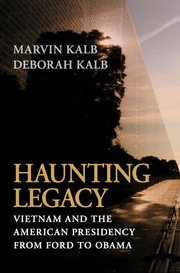Q&A with USA Today's Chuck Raasch
 Monday, May 21, 2012 at 8:18PM
Monday, May 21, 2012 at 8:18PM Q&A with Chuck Raasch, national reporter for USA Today, who has covered six presidential campaigns.
Q: How do you think the Vietnam War's legacy has affected subsequent presidential campaigns, and which campaign that you've covered do you think was the most affected by that legacy?
A: It’s been heavily ingrained in every campaign since, and in degrees we always do not see or appreciate. The war, along with Watergate, changed the relationship between the press and the government, starting with the 5 o’clock follies, and continuing into the aggressive journalism of the Pentagon Papers, My Lai, and other stories, that sharpened the adversarial role of the press that simply did not exist in earlier wars. That in turn helped usher in a long period of mistrust in American institutions in general.
We are still in that era, as evidenced by record-low approval of Congress and much lower confidence levels expressed in almost all institutions, including the press itself. The Clinton campaign of ’92 was the most affected of those I covered. First, there were direct allegations that Bill Clinton had to address that he had avoided the draft. His election was seen as a highly symbolic passing of the torch from the World War II generation of George H.W. Bush, to the Vietnam generation of Clinton and Al Gore. The first George W. Bush campaign of 2000 was close to that in all of the questions swirling out about Bush’s Vietnam-era service. As you will recall, that story directly led to Dan Rather’s falling out with CBS.
Q: No candidate who served in Vietnam has ended up in the White House, a stark contrast with World War II veterans, many of whom later became president. What pattern do you think could emerge in future if veterans from the wars in Iraq and Afghanistan were on a major party's national ticket?
A: I believe that Americans fundamentally view veterans of Iraq and Afghanistan far differently than veterans of Vietnam were viewed in the ‘70s, precisely because of the experiences of those Vietnam veterans. There is far more willingness, even among those who opposed the Iraq and Afghanistan wars, to separate the war from the warriors. I also believe there is a fundamental difference in Iraq and Afghanistan vets’ willingness to talk about their experiences, both good and bad. As I wrote in a recent USA Today cover story, they are being encouraged to do so by doctors and psychologists who are mindful of what happened when Vietnam vets came home, often to silence, disinterest and, sometimes, derision.
Q: In your opinion, could John Kerry have handled the Swift Boat Veterans for Truth's ads against him in 2004 in a way that could have proved less damaging to his campaign?
A: I am not sure. Some say he took too long to respond. Part of what made the attacks effective was Kerry’s well-known history of anti-war activity once he came back, and these attacks – fair or unfair – were more broadly framed as a result.
Q: Bill Clinton, who did not serve in the military and opposed the Vietnam War, was able to defeat two World War II heroes in George H.W. Bush and Bob Dole. Barack Obama, who also didn't serve in the military, defeated a Vietnam War POW, John McCain. What does that say about the importance of military service for a presidential candidate?
A: More than anything, it says how the resumes of public servants have changed since the end of the draft. Because it is an all-volunteer service, we simply do not have a broad societal connection with the military any longer, and that is reflected in those elected president, just as it is down ballot. Since 1980 – and you can check the numbers for sure – the percentage of veterans in Congress has dropped by a large number. I would caution against oversubscribing the veteran angle here. The cases cited above, I think, are not reflective of a larger military service vs. non-military service question.
They were more the result of good political timing and opportunistic political gambles than anything. I’d argue Clinton won because the economy was so bad people overlooked the wrinkles around his Vietnam draft status; other potential candidates who also might have beaten Bush, and who were vets, took a pass in 1992; ‘96 was simply an incumbent’s year. And John McCain’s military service, while certainly a factor in his favor, in my view, was not enough to overcome the economic and other winds blowing against his incumbent party, and a campaign that never seemed to find its focus and center.
Q: This 2012 presidential election is the first since 1944 where neither major party candidate served in the military. Is this the wave of the future, given that the all-volunteer military represents such a small percentage of Americans?
A: I never predict anything, and indeed, candidates who served in Iraq and Afghanistan may actually have an advantage in the nominating process going forward. But see my answer to number 4 for this. The math is certainly against veteran candidates in the future, because so few of them are out there, relatively speaking.
Q: Anything else we should know?
A: I think the vet vs. non-vet issue is highly relevant in journalism, too, in everything from how we cover wars to the upcoming and unavoidable debate over the size of the military. The Pentagon, wars, anti-war movements at one time were covered by a lot more veterans. Today, that is not the case, for reasons cited above. How that has changed the coverage of these issues is worth contemplating.
Interview with Deborah Kalb, co-author of Haunting Legacy.



Reader Comments